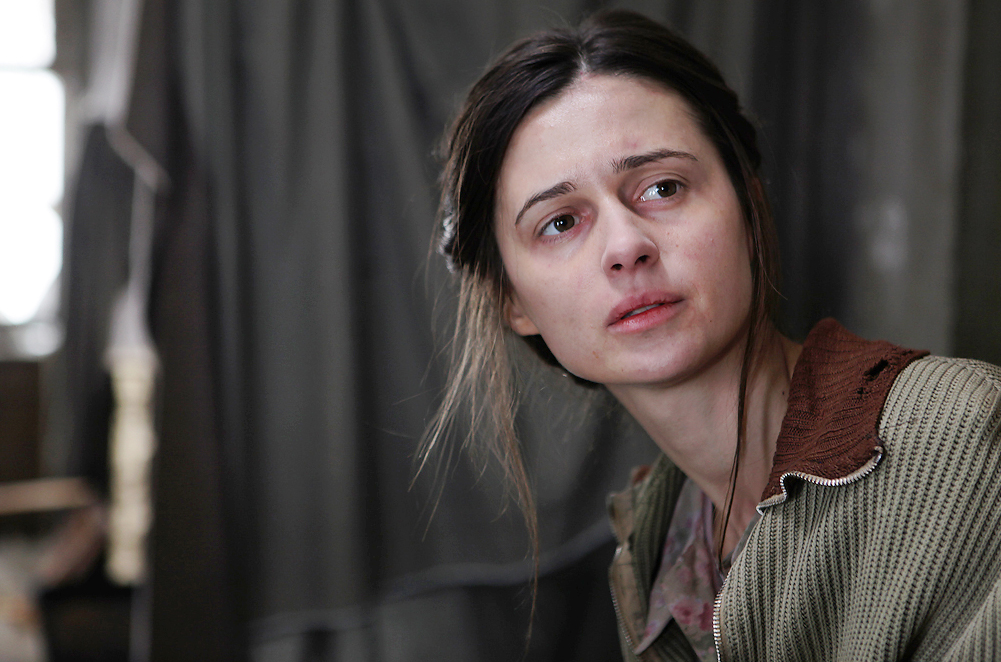 Robert Pałka/Fotos-Art/Film Studio Zebra
Robert Pałka/Fotos-Art/Film Studio Zebra
"In Darkness" defies the black-and-white boundaries of good vs. evil, beginning with the title character, Leopold Socha, a sewer worker and petty thief who ends up risking his life to save a group of Jews in the ghetto of Lviv. What makes his actions all the more incredible is his self-professed anti-Semitic views and, of course, his pilfering ways. While he starts out his good deed with the hope of financial gain, he ends up showing a great deal more sympathy than he might have anticipated he was capable of. The grey areas of morality are further blurred by the representation of the Jews as characters who are just as weak, selfish and cruel - these characters are far from typecast based on any national or racial profiles. Those who are persecuted are not instantly bestowed with a shroud of honour and dignity, while those who are guilty of crimes are capable of repenting and demonstrating varying degrees of good will.
Holland seems to give the story, based on Robert Marshall's true story "In the Sewers of Lvov", leave to make its own impression on the audience, straying from superfluous cinematic techniques aimed at drawing empathy. Kenneth Turan of the Los Angeles Times calls Holland's directing style "cool, almost dispassionate". Wall Street Journal's Joe Morgenstern calls it "excrutiating and inspiring". Wendy R. Weinstein of Filmjournal.com opts for "unsparing, unsentimental and unforgettable". Weinstein describes the emotional impact of the suspense created by the director:
Holland maintains the tension in this long, wrenching film largely through keeping Socha’s commitment ambivalent. When we’re not fearing Socha giving up on the trapped Jews, we’re fearing the Nazis trapping Socha. Above the sewers, innocent Poles hang in the town square as warning, and anyone can be stopped and shot at a moment’s notice. The ghetto is deserted, all the Jews who lived there now dead or in concentration camps.
The choice of filming "In Darkness" in Polish, Yiddish, German and Ukrainian, as opposed to English, was another controversial decision made by the director. Nonetheless, as Turan points out, the characters' difficulty in understanding one another "underlines the fraught complexity of Poland's ethnic situation and points out, for instance, the way the Germans used Ukrainians like Socha's friend Bortnik (Michal Zurawski) to do the dirtiest of their dirty work".
Holland takes on the issues of linguistic and cinematic convention with regard to the film in a recent interview with PISF (Polish Film Institute), explaining that realism was her goal above all. She strove to avoid the conventions of Hollywood and a "theatricality, where the language and actors are Anglo-Saxon" which distanced the audience from the reality of the film.
The true test, however, of a film that bases its action on real-life human tragedy is its impact on the real-life survivors of that tragedy. Many critical reviews speak of Krystyna Chiger, 76, who did live in the sewers of Lviv during the war and documented her experience in her own book, "The Girl in the Green Sweater". Chiger has remarked that the film's realism brought her back to the sewer, with all its smells. In an interview with the New York Times, she expressed her contentment that the film was not a 'Hollywood version' and said "I think she did a very good job, showing the positive and the negative and how they meld together. She showed the selfishness, the goodness. It was what really happened".
In her review on filmjournal.com, Wendy R. Weinstein writes that
Holland, with her gifted production team, miraculously finds the right tone, keeping us down in the sewers with all their stink, claustrophobia and vermin, suggesting what it might be like to live without light or fresh air for 14 months in constant fear of discovery and annihilation. It is not easy to watch, but it is impossible to turn away.
While the majority of reviewers share the opinion that the film is a harrowing glimpse into the horrors of World War II, they are often left with the unsettling impression that the question of Socha's motivation is never answered, the question of how he could risk his own life and that of his family for a family of strangers.
As Robert Wieckiewicz, the Polish actor who plays Socha, tells the New York Times' Larry Rohter,
This is the mystery of the human heart. From today’s perspective we have a tendency not to help when someone knocks at our door and wants a bowl of soup or a coin. So I am fascinated by those people who in wartime circumstances, with death threatening at every instance, meet another human being and say, "I will give you a helping hand." It’s a fantastic secret, one I am never going to be able to solve.
Rohter also takes note of the absence of star power in the film, something Holland purposely avoided, once again opting to put the story itself in the spotlight, with acting done by professionals who are, nonetheless, not so well known on the world screen.
"In Darkness" is a 2012 Oscar contender in the Best Foreign Film Category. It has also garnered a nomination for the 2012 Critics' Choice Awards in the same category.
Written by: Agnieszka Le Nart, Culture.pl
Source: www.filmjournal.com, articles.latimes.com, www.nytimes.com, pisf.pl